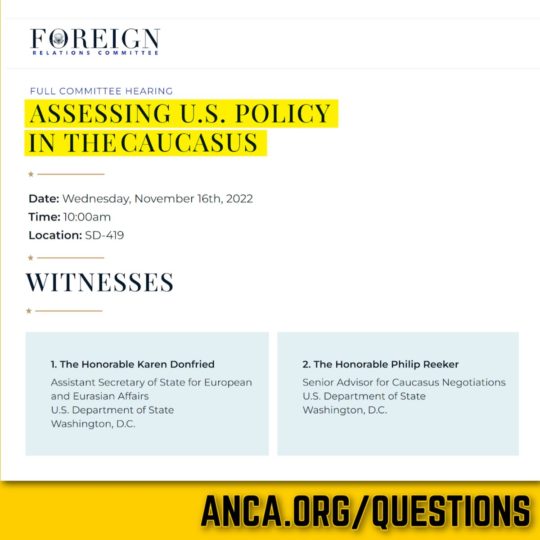
U.S. Senate Foreign Relations Committee Hearing
“Assessing U.S. Policy in the Caucasus”
Wednesday, November 16, 2022 – 10:00 AM
Witnesses:
— Karen Donfried, Assistant Secretary of State for European and Eurasian Affairs
— Philip Reeker, Senior Advisor for Caucasus Negotiations, U.S. Department of State
Section 907 – Aid to Azerbaijan:
— Why is the Biden Administration sending U.S. taxpayer funded military aid to the oil-rich and deeply corrupt Azerbaijani government, even as it ethnically cleanses Artsakh (Nagorno Karabakh), illegally detains and abuses Armenian POWs, and desecrates Christian Armenian holy sites?
— Has the State Department responded to requests from Armenian Americans – specifically the Armenian National Committee of America – to meet with senior Department officials prior to any decision to waive or enforce Section 907 of the Freedom Support Act?
— What message are we sending to Turkey and Azerbaijan by waiving Section 907 of the FREEDOM Support Act, opening the door to U.S. military aid to Azerbaijan, despite its Ankara-backed attack on Artsakh (Nagorno Karabakh), its cross-border incursions and occupation of Armenian territory, and its illegal detention of Armenian prisoners of war?
— Secretary of State Antony Blinken – during his confirmation hearing – testified that he looked forward to: “working with Congress and the Secretary of Defense to determine the appropriate level of assistance to meet the security needs of Armenia and the region.” Can you walk us through how exactly the Administration worked with Congress regarding the Administration’s decision to waive Section 907 of the FREEDOM Support Act?
Aid to Artsakh:
Armenians in Artsakh (Nagorno Karabakh) continue to face an acute humanitarian crisis, including threats of renewed attacks and chronic water, energy, healthcare, and food insecurity.
— What specific actions has the Biden Administration taken to help at-risk Armenians living in Artsakh (Nagorno-Karabakh)? Please cite program descriptions, partner organizations, deliverables, budgets, and other relevant details.
— What specific plans does the Biden Administration have to help at-risk Armenians living in Artsakh (Nagorno-Karabakh)? Please cite program descriptions, partner organizations, deliverables, budgets, and other relevant details.
— Has the Biden Administration conducted a needs assessment for Artsakh (Nagorno Karabakh)? If so, can you share this assessment with relevant Congressional committees and the general public?
U.S. Parts/Technology in Turkish Drones:
— Has the Administration undertaken any investigation into the discovery of as many as ten (10) U.S. components in the Turkish Bayraktar UAVs used by Azerbaijan to attack civilians in Artsakh (Nagorno Karabakh) as potential violations of U.S. arms export control restrictions and other U.S. and international laws?
Foreign Mercenaries/Prohibited Munitions:
— Has the Administration investigated reports that Azerbaijan used prohibited munitions (white phosphorus, cluster bombs) and deployed Turkish-recruited mercenaries from Syria against Artsakh (Nagorno Karabakh)? What, if any, are the findings of this investigation?
Azerbaijan’s Desecration of Armenian Christian Holy Sites:
— Has the Biden Administration provided funding, access to satellite imagery, or other assistance to academic, civil society, and other groups monitoring, preserving and protecting the rich Armenian Christian heritage across Artsakh (Nagorno Karabakh), including areas currently under the control of the Azerbaijani military? Please describe any such efforts, citing program descriptions, partner organizations, deliverables, budgets, and other relevant details.
Armenian Genocide:
American recognition of the Armenian Genocide – a welcome move by Congress and then the White House – comes with U.S. governmental responsibilities, among them not aiding and abetting countries – like Turkey and Azerbaijan – that deny this crime and actively and intentionally seek to drive Armenians from their indigenous homeland of thousands of years.
— How does the Administration justify recognizing the Armenian Genocide on April 24, 2021 and then – just days later – greenlighting U.S. military aid to a government of Azerbaijan that openly denies this crime, incites anti-Armenian sentiment, and launches attacks against Armenians in Artsakh (Nagorno Karabakh) and Armenia?
— What specific steps has the Administration taken – in the wake of Executive and Legislative branch recognition of the Armenian Genocide – to press the Turkish government to end its denials and reckon honestly with its present-day responsibilities for this crime?
Pending Legislation:
What are the Biden Administration’s views on the following legislative initiatives?
— S.Res.797, condemning Azerbaijan’s aggression and calling for an end to U.S. military aid to Azerbaijan.
— H.Res.1351, a bipartisan resolution calling for an end to all U.S. military aid to Azerbaijan.
— H.Res.1400, condemning Azerbaijani war crimes (U.S. parts in Turkish drones, foreign mercenaries, prohibited munitions, abuse of prisoners of war.)
— H.Res.240, demanding Azerbaijan’s immediate release of Armenian POWs.
— The Cardenas-Schiff-Sherman Amendment to the FY23 NDAA, requiring an investigation of Azerbaijani war crimes (U.S. parts in Turkish drones, foreign mercenaries, prohibited munitions, abuse of prisoners of war.)
— The Pappas-Pallone Amendment to the FY23 NDAA, placing restrictions on F-16 sales to Turkey.